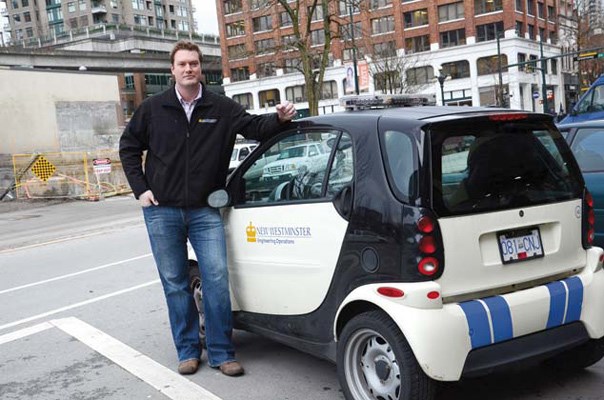The City of New Westminster is piloting programs aimed at making recycling easier for Royal City residents.
Residents may have noted that several "public space recycling kiosks" have been placed at several locations in the city. The pilot project was launched in October, and Kristian Davis, the city's supervisor of solid waste and recycling, said it's going well.
"We have five of them so far. We have plans to implement more in 2012," Davis said. "We have had a few comments about, 'finally New West has recycling options provided at street level.'"
Davis said the city wants to test the kiosks and see if this is something that could be expanded. They accept items such as bottles and cans, waste and newspapers.
Councillors Jonathan Cote and Bill Harper had recommended the public space recycling program to city council, having seen a successful program during a visit to Halifax. While one public space recycling program has technology that includes solar compacting of recyclables, the City of New Westminster opted against units that cost $10,000 each and purchased five units that cost $800.
Davis said staff collects the waste from the kiosks several times a week, and the contents are taken to the city's works yard and monitored to see how well the program is doing.
Kiosks can be found at Hyack Square, the New Westminster SkyTrain station (on Eighth Street), the corner of Sixth Avenue and Seventh Street, outside the Columbia SkyTrain station (on Columbia Street) and near Sapperton Park (at the corner of Sherbrooke and East Columbia streets). Future sites could include the 22nd Street SkyTrain station, the waterfront boardwalk and uptown and downtown commercial areas.
"It's been going very well," Davis said. "I hate to sound like a broken record. . When you are providing people with more recycling options, the feedback you get is generally positive."
A similar story is unfolding with the multi-family organics pilot project that got underway in April 2011. The pilot project involves the collection of organics from a handful of multi-family residences, a service that's currently only offered citywide to single-family homes.
"We currently have six apartments taking part," Davis said. "It's at no additional cost to those taking part."
Jim Lowrie, the city's director of engineering, said staff will report to council on the program in February, but early indications are that it's been positive, has had good participation rates and hasn't seen a lot of contamination of items.
Council approved the pilot project in February 2011 and suggested the service could be incorporated into the city's existing multi-family collection services. The city had estimated at the time that food scraps recycling would help divert 20 to 30 per cent of waste generated by residents in the multi-family sector.
Worm composting is available to residents of multi-family dwellings, but no food scrap collection program is currently offered.
Funding for the pilot project, estimated to cost $12,000, was included in the solid waste utility's 2011 operating budget.
If expanded citywide, Davis said the program would result in a slight increase in utility fees for residents of multi-family dwellings. He said their 2011 rates were $17.50 per unit, and the added services could result in an additional cost of $4 to $6 per unit per year.
While city crews collect garbage and recyclables from single-family homes, the city subcontracts Waste Management to collect from multifamily dwellings.
"We also subcontracted Waste Management to do this as a pilot project," he said. "This has been going exceptionally well. I would like to congratulate the efforts of Waste Management."
Before rolling out the pilot project, Waste Management staff spoke to residents at the six buildings about the program and handed out information to help them.
"We have had zero contamination whatsoever, which is almost unheard of in a multi-family pilot," Davis said.
Davis said he receives a lot of calls from residents of multi-family residences asking about organics collection.
"I would like to step in and say we can pro-vide that service," he said. "Ultimately it is a council decision."
Davis will report to council on the success of the pilot program in February. He will be recommending that it be expanded citywide so the city is offering the same service to residents of multi-family residences as single-family homes and to allow the city to reach Metro Vancouver's 70 per cent waste diversion goals.
"I'd like to give all residents and fair and honest opportunity to recycle and dispose of what they have in the most responsible way possible," he said.



